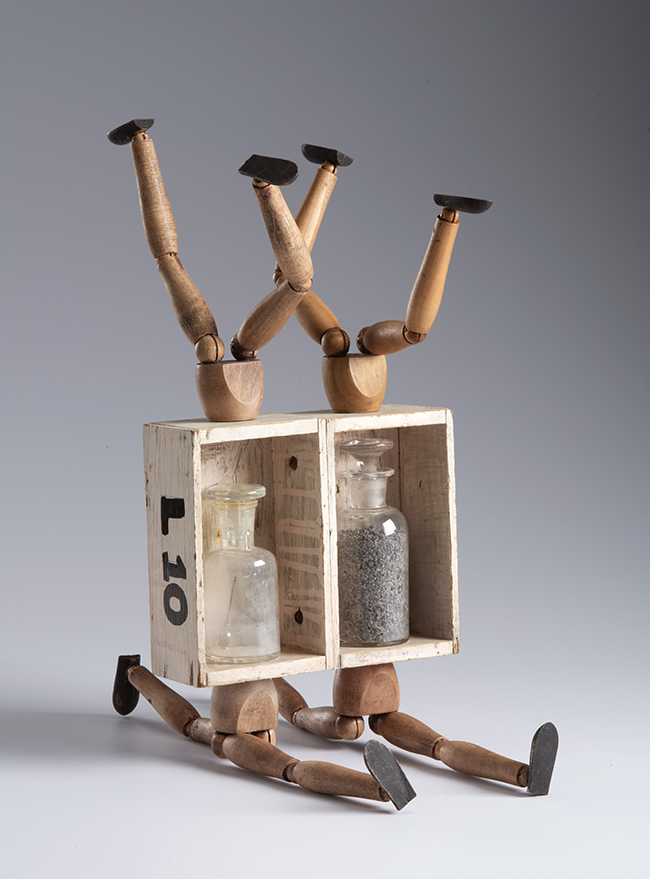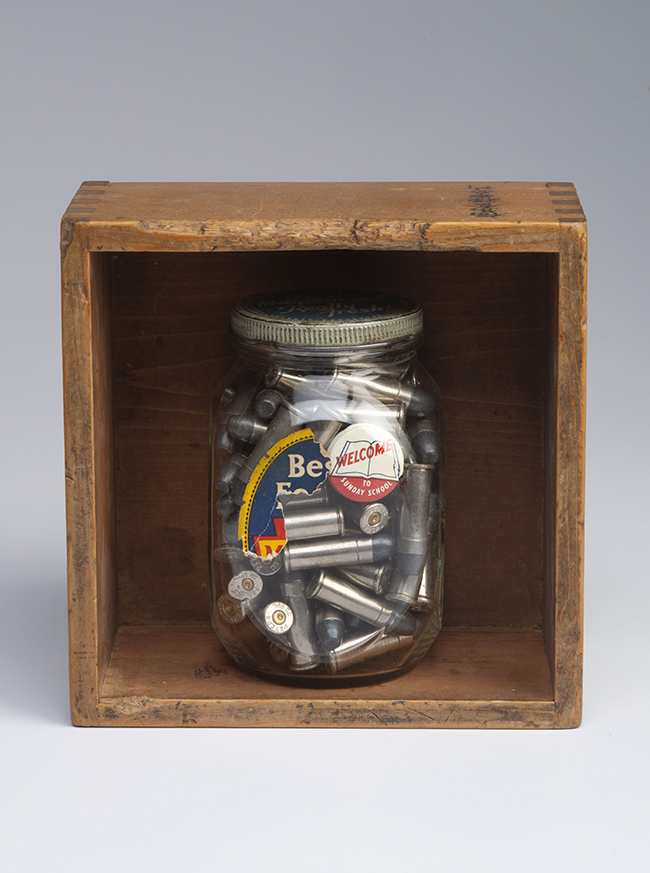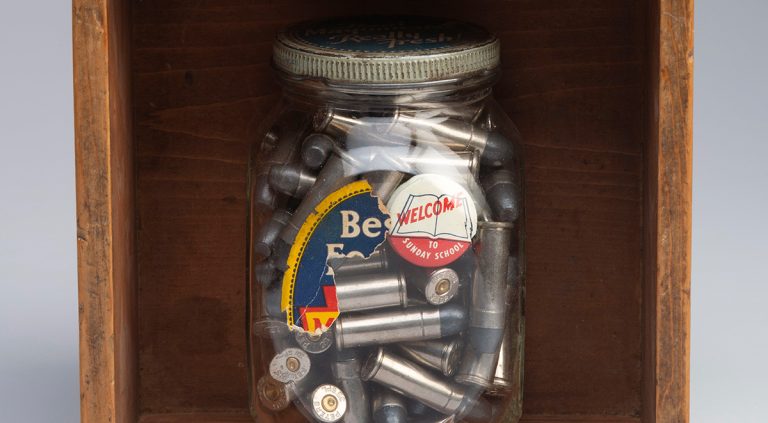Clint Imboden is a 3D artist based in the San Francisco Bay Area whose sculptures and installations delve into social and political commentary. Known for his use of nostalgic mid-20th-century objects, Clint juxtaposes hand tools, toys, and other everyday materials with text to evoke layered narratives. His larger works reflect an obsessive love for collecting, transforming hundreds of identical items into abstract forms. Growing up in St. Louis, Clint’s parents instilled in him a deep appreciation for kitsch and Americana, fueling his art-making process today. His weekly ritual of visiting flea markets is not just about acquiring objects but about exploring their potential as vessels for meaning. In his Oakland studio, these discarded items evolve into pieces that challenge and provoke, often addressing topics like addiction, gun violence, and the shifting social landscape.
Exploring Drug Addiction: Poppy Seed

In Poppy Seed (2024), Clint confronts the dark and pervasive issue of drug addiction, particularly heroin use. The assemblage features glass medical containers holding poppy seeds and a single hypodermic needle. These simple components come together to form a stark, thought-provoking statement about substance abuse.
The choice of materials is deeply personal for Clint, rooted in his decade-long career in community mental health. During this time, he worked closely with individuals navigating court-based drug diversion programs and those battling chronic mental illness alongside substance use disorders. The glass containers in the piece serve as metaphors for fragility—of lives, systems, and societal support structures—while the poppy seeds symbolize the origins of opiates, tracing back to their raw, unassuming beginnings.
By placing these objects together, Clint crafts a story of loss, resilience, and systemic failure. The work is intentionally minimalist, allowing viewers to project their own understanding of addiction onto the assemblage. The needle becomes a symbol of both harm and hope, pointing to the duality of medical interventions and the devastating consequences of misuse. This personal yet universal exploration challenges us to confront the complexities of addiction beyond stereotypes and headlines.
Gun Violence and Innocence: Welcome to Sunday School

Welcome to Sunday School (2024) takes on another urgent topic: gun violence in spaces once considered sanctuaries. The assemblage critiques how churches, traditionally symbols of safety and moral guidance, have become sites of tragedy in America’s gun crisis. For Clint, the church of his youth was a protective haven, a place where the outside world’s chaos seemed far away. This idyllic perception now clashes with the reality of metal detectors at church doors and a lack of meaningful gun reform.
The work combines religious iconography with subtle yet jarring elements that evoke fear and loss. Clint’s minimalist approach leaves space for reflection. The title itself—Welcome to Sunday School—juxtaposes the innocence of childhood religious education with the chilling reality of violence infiltrating sacred spaces.
Clint’s frustration with inaction is palpable. His statement about “words being cheap” underscores the hollow rhetoric of religious leaders condemning gun violence while failing to mobilize for change. The piece doesn’t just critique; it mourns the loss of innocence and safety for children growing up in a world where such tragedies are normalized. The assemblage provokes questions about societal priorities, responsibility, and the failure to protect the most vulnerable.
Transforming the Overlooked
Central to Clint’s practice is the transformation of overlooked objects into poignant commentary. His process begins at flea markets and estate sales, where he scours for items that speak to him—rusty shovels, vintage rulers, and old toys. These relics of blue-collar life carry stories of labor, memory, and neglect. In his hands, they become vessels for dialogue, imbued with new narratives through careful arrangement and the addition of text.
Clint’s use of repetition—such as amassing hundreds of the same item—creates a hypnotic effect in his larger installations, encouraging viewers to see familiar objects in unfamiliar ways. These works reflect his love for form and his ability to extract meaning from the mundane.
Material-Based Commentary
Clint’s art is rooted in materials, drawing on their historical, cultural, and emotional connotations. This materiality is particularly evident in his use of text, laser-etched onto objects. The practice, which began in response to the political upheaval of the 2016 election, allows him to amplify the inherent symbolism of his materials. Words carved into wood or metal become permanent scars, emphasizing themes of permanence and memory.
Both Poppy Seed and Welcome to Sunday School demonstrate Clint’s ability to distill complex issues into simple yet evocative forms. By using objects already “pregnant with meaning,” as he describes, Clint pushes viewers to reconsider their assumptions and confront uncomfortable truths. His work resonates not through spectacle but through its ability to connect personal experience with broader societal concerns.
In a world awash with noise, Clint Imboden’s sculptures offer quiet, deliberate statements that demand attention. They are reminders of the power of art to provoke thought and foster dialogue, one overlooked object at a time.

